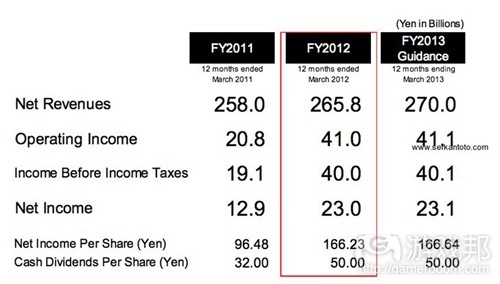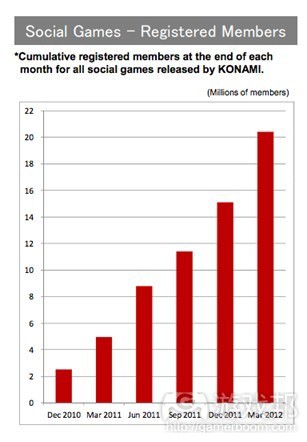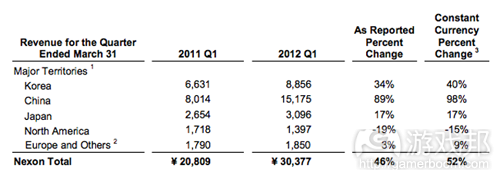每日观察:关注美国社交游戏市场发展减缓(5.11)
1)市场调研公司Frank N. Magid Associates最近报告指出,美国社交游戏用户增长速度已开始减缓,用户体验社交游戏的时间也出现下降趋势。
报告称目前有38%社交网络用户在玩社交游戏,仅比去年的36%增长两个百分点。在12-47岁的女性用户(游戏邦注:这是社交游戏玩家中的主力军)群体中,仅有47%玩家每周都要玩这类游戏,而2011年的这一玩家比例为54%。
预计每名玩家今年在社交游戏中的平均投入为51美元,而去年的这一数据高达78美元。34%玩家表示明年在社交游戏中的消费额还会更少,仅有22%玩家表现今后将提高消费额。
但并非所有社交游戏公司都受到了影响,例如Zynga上月发布的财报就显示其收益同比上年增长三分之一,达到3.21亿美元(有2.928亿美元来自游戏,其他为广告收益)。
2)据日经新闻报道,继GREE和DeNA宣布将从游戏中移除备受争议的Kompu gacha机制之后,日本发行商Konami也宣称将采取同样措施,并称此举不会给公司收益造成重大影响。据其所称,公司通过Kompu gacha机制创造的收益在旗下社交游戏收益中仅占比5%。
Konami最近财报称公司旗下的Digital Entertainment在2012财年(截止3月份)收益为1404亿日元(约合17.6亿美元),超过2011财年的1331亿日元(16.6亿美元)。利润也从原来的129亿日元(1.61亿)美元增长至230亿日元(2.88亿美元)。
社交游戏在公司收益中占比近四分之一,约367亿日元(4.59亿美元),超过2011财年的158亿日元(1.98亿美元)。Konami社交游戏注册用户已从2011年3月份的500万增长至目前的2000多万。
3)总部位于日本东京的韩国网游公司Nexon最近财季(截止2012年3月31日)报告指出,该时期公司免费增值模式及网游在中国及韩国市场表现强劲;iOS和Android游戏《Kartrider Rush》目前下载量已达820万次;
尽管公司活跃用户已从上年的8620万略降至8280万,但付费用户比例却从8.3%增长至10.9%。
(游戏邦注:据insidesocialgames报道。平均每付费用户收益从去年同期的17.87美元增长为22.05美元;Nexon于去年在东京证券交易所上市并集资11.7亿美元,目前市值达78亿美元,超过EA的47.7亿美元和Zynga的58.6亿美元)。
Nexon在这一季度收益为3.811亿美元(304亿日元),比去年同期的2.611亿美元增长46%;其中有1.904亿美元(约占半数份额)来自中国市场,有1.111亿美元来自韩国市场,而来自北美市场的收益仅为1750万美元。
该季度公司利润为1.553亿美元,同比上年的9520万美元增长63%。
4)据Business Insider报道,有匿名知情者透露,EA和Playfish的热门Facebook游戏《模拟人生社交版》最近已经被转移到其印度工作室,此举令人颇为困惑。
需注意的是,EA Playfish之前常把将被关闭的项目移送到该工作室(知情者称Playfish印度工作室“劳动力成本和房租都相对低廉”),而《模拟人生社交版》虽然未能打败Zynga游戏《CityVille》,自去年秋季以来用户流量也出现下滑,但最近仍展开了不少品牌营销活动,并且拥有700万日活跃用户,EA无论如何都不应该过早取消这一项目。
针对这一传闻,EA通过venturebeat解释称《模拟人生社交版》仍是EA头号社交游戏,背后拥有英国和美国工作室的75人团队进行维护,他们并不打算移除这款成功的社交游戏。(本文为游戏邦/gamerboom.com编译,拒绝任何不保留版权的转载,如需转载请联系:游戏邦)
1)Social game audience growth is slowing in the U.S. – study
by Eric Caoili
After exploding in recent years, the rate of audience growth for social games is now slowing considerably in the U.S., according to a new study.
The Magid Media Futures 2012 study has found that not only is user growth slowing for social games, but the industry’s biggest demographic is playing them less, and gamers are spending less on them on average.
Research firm Frank N. Magid Associates found that 38 percent of social network users currently play social games, compared to 36 percent last year. And only 47 percent of the biggest category of social game players, females aged 12 to 44 years old, play them on a weekly basis now, as opposed to 54 percent in 2011.
And the study found that the average social network gamer will spend an average of $51 this year on them, compared to the $78 they spent last year. 34 percent of gamers also said that they plan to spend even less next year, while 22 percent said they will spend more.
Not all social game companies appear to be affected, though — Zynga reported last month that its revenues grew by a third year-over-year to $321 million ($292.8 million of that from its games, and the remainder from ad sales).
The FarmVille maker also grew its monthly active user count by a quarter to 292 million, thanks to big titles like Draw Something and Hidden Chronicles — that number has since fallen to 265 million players on Facebook, though.(source:gamasutra)
2)Konami halts questionable virtual goods as social game revenues soar
by Eric Caoili
Konami has joined a number of major mobile social game companies that are abandoning a questionable virtual goods sales practice that’s been the source of controversy in Japan lately.
The publisher and many other game companies took a hit at the stock market on Tuesday, following reports that Japan’s Consumer Affairs Agency will regulate “kompu gacha,” a popular method for selling random virtual goods in mobile social games. Some have criticized “kompu gacha” for resembling gambling.
Two of Japan’s biggest mobile social game networks Gree and DeNA, responded before the agency could announce its decision, and said they’re removing “kompu gacha” from games on their services. Developers like Namco Bandai, KLab, and now Konami have also pledged to give up the practice.
Konami claims that it will not see a significant impact in its earnings after removing “kompu gacha” from its social games, according to a Nikkei report translated by Andriasang. The publisher says that sales from the practice accounted for just 5 percent of its social game revenues.
Social games contribute a significant portion of sales to Konami’s Digital Entertainment segment, which just reported revenues of ¥140.4 billion ($1.76 billion) for the fiscal year ending March, compared to ¥133.1 billion ($1.66 billion) in the previous year. Its profits also grew from ¥12.9 billion ($161 million) to ¥23 billion ($288 million).
Konami notes that its social games accounted for nearly a quarter o those revenues, or ¥36.7 billion ($459 million), up from ¥15.8 billion ($198 million) during its 2011 fiscal year. That jump isn’t surprising, considering the total number of registered users for Konami’s social games grew from 5 million in March 2011 to more than 20 million now.
The company says it will continue to take advantage of the growing popularity of smartphones and tablet PCs, as it has so far with hit mobile social games like Dragon Collection and Sengoku Collection. It points to Zynga as a model it’s pursuing, in releasing games to a wide range of platforms.(source:gamasutra)
3)Free-to-play business model pays off for Nexon in Q1
by Mike Rose
Tokyo-headquartered online game publisher Nexon has posted increases in revenue and profits year-over-year, thanks to the company’s focus on the free-to-play business model.
The company said it saw strong growth for its free-to-play and online games in China and Korea during the quarter, although this was slightly offset by an underwhelming performance for its games on North America. This, it said, was a result of “certain operational challenges” in the region.
Even with these issues, Nexon still managed to exceed its expected performance for the first quarter.
Nexon said that a number of the titles it launched in 2011, including Cyphers, SD Three Kingdoms and Mabinogi Heroes, maintained strong growth throughout this fiscal year’s first quarter.
In particular, iOS and Android game Kartrider Rush has now been downloaded 8.2 million times to date.
Although the company’s monthly active user count declined slightly to 82.8 million from 86.2 million year-over-year, it saw its paying user rate increase to 10.9 percent of its total users paying, from 8.3 percent year-over-year.
For the quarter ended March 31, 2012, Nexon posted revenues of 30.4 billion yen ($381.1 million), up 46 percent compared to 20.8 billion ($261.1 million) year-over-year. Of this total figure, 15.2 billion yen ($190.4 million) — around half — came from China, while 8.9 billion yen ($111.1 million) came from Korea. In comparison, 1.4 billion yen ($17.5 million) came from North America.
The company posted quarterly profits of 12.4 billion yen ($155.3 million), up 63 percent compared to 7.6 billion yen ($95.2 million) year-over-year. (source:gamasutra)
4)Will EA, Playfish pull the plug on The Sims Social? [Update]
by Joe Osborne
Fat chance. Business Insider reports that The Sims Social, EA and Playfish’s most popular game on Facebook, has been handed off to the latter’s India studio. According to Business Insider’s nameless source, that’s where the developer’s Facebook games go to die. But what about that extensive advertising deal and the game’s relatively healthy 2. 7 million daily players?
Poppycock–Business Insider’s source said that Playfish India is “just going to keep the lights on. It’s a very cheap market for employees and rent.” There’s no denying that The Sims Social was a last-ditch effort of sorts to combat Zynga’s biggest games, and the simulator held its own for quite a while. Regardless of whether The Sims Social has been in steady decline since last fall, it would be downright silly for EA to sunset its most popular Facebook game.
Besides, with Playfish China reportedly full speed ahead on SimCity Social, Playfish San Francisco working on a secret social game and The Sims maker Maxis with a social game in the works, what reason would Playfish HQ in London have to drop The Sims Social? The game is losing players, but so are FarmVille, CastleVille and even CityVille, according to AppData.
If there are any games for Playfish to shutter for resources’ sake, why not give stragglers like NHL Superstars, Baking Life and World Series Superstars the ax? We’ve reached out to EA for comment.
Update: EA provided the following statement to VentureBeat recently:
The misinformed article stating that The Sims Social is on life support couldn’t be further from the truth. The Sims Social continues to be EA’s top social game, supported by a dedicated team of 75 in the U.K. and U.S. and will see a robust and steady stream of new game-expanding content as it continues to build upon its thriving community and drive continued success. We have no plans to walk away from a very successful game based on one of the most popular brands in video game history.(source:games)












































 闽公网安备35020302001549号
闽公网安备35020302001549号